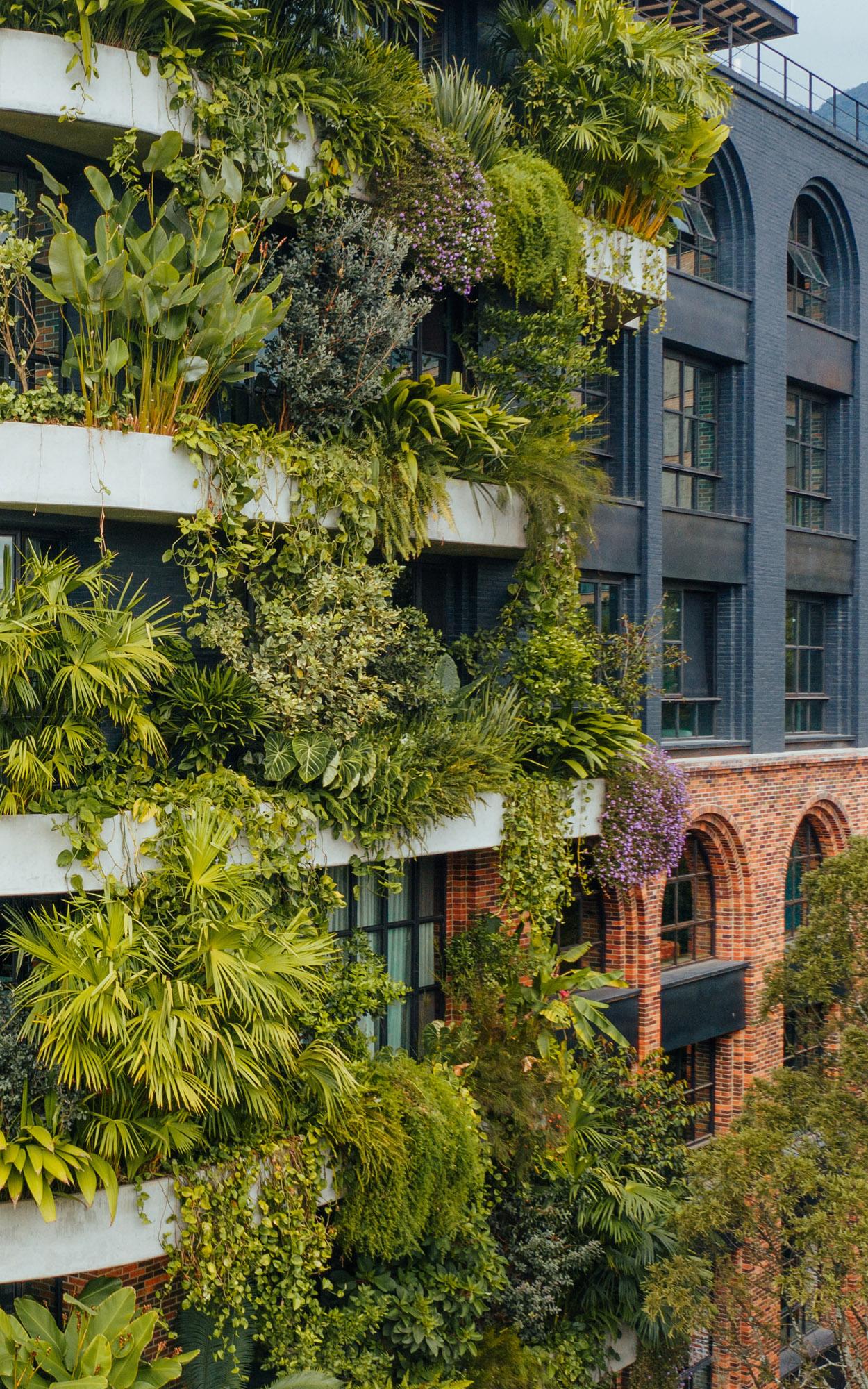Don’t miss this World Bank webinar on urban nature
On 20 October, an expert panel convened by ICLEI and the Humboldt National Research Institute of Biodiversity in Colombia is discussing “Cities Working With Nature to Improve Resilience and Urban Life”. This exciting event forms part of the World Bank’s webinar series “Bringing Nature to Cities: Integrated Urban Solutions to Biodiversity Loss and Climate Change”. The 20 October session is illustrating how cities around the world are restoring nature back into the city to improve livability, health, sustainability, climate resilience, and overall well-being. The event is showcasing two global programs supported by international organizations, BiodiverCities by 2030 and CitiesWithNature — RegionsWithNature, followed by a presentation of best practices. Examples will demonstrate how cities around the world are working with nature to deal with everyday urban challenges, making nature a central part of the urban landscape and helping urban communities live in harmony with the environment. These presentations will focus on urban biodiversity and sustainable economy, citizen science, climate resilience and human health and well-being (focusing on inequality and social cohesion).
MODERATOR
Jennifer Lenhart, Global Lead, WWF Cities
SPEAKERS
Hernando García, General Director, The National Research Institute of Biodiversity “Alexander von Humboldt”, Colombia, Kobie Brand, Deputy Secretary General, ICLEI, Felipe García, Head of the Biodiversity Sciences Program. The National Research Institute of Biodiversity “Alexander von Humboldt”, Colombia, Ingrid Coetzee, Director Biodiversity, Nature and Health, ICLEI, Dora Almassy, Researcher, Central European University
Register for this event here: https://www.thegpsc.org/events/gpsc-webinar-series-bringing-nature-cities-cities-working-nature-improve-resilience-and-urban

Co-hosted by the Global Platform for Sustainable Cities (GPSC) and the Global Program on Nature-Based Solutions for Climate Resilience, the World Bank series of thematic events provides an online knowledge exchange platform connecting policymakers, practitioners, and experts to further mainstream biodiversity considerations into cities and development projects. See past and future events in this series here: https://www.thegpsc.org/
Enhancing urban nature via indigenous land management in Australian cities
Urban nature areas can benefit from indigenous land management practices such as cultural burns. The Australian city councils of Adelaide, Cairns and Yarra shared how they are partnering with Traditional Owners to achieve this at a recent webinar hosted by ICLEI Oceania.
The speakers explored how councils can work together more effectively with Traditional Owners to protect and restore nature in and around urban areas. The session was introduced by Councillor Amanda Stone from the City of Yarra, who is also Chair of ICLEI’s Regional Executive Committee. She highlighted the importance of recognising the owners of the land. “We have entered the UN Decade of Ecosystem Restoration, yet we have been causing enormous damage to our planet, we have been dismissing nature and using more resources. We need to bring nature back. Here in Australia, we are lucky to live in a land with thousands of years of transmitted knowledge through Traditional Owners about how to live in harmony with nature, how to respect the land. Learning from Traditional Owners is a gift but it is also a door to the future of more respectful relations with nature and the ancient land. So that we all have a future”.
Three stories were then shared about how the Councils of Cairns, Adelaide and the Yarra Ranges are working with traditional owners, their approach and protocols, and how these are being applied to biodiversity and NbS initiatives.
In the Cairns Regional Council, Sophie Barrett, Advisor Strategy & Sustainability, shared how the Council aims to develop a set of inclusive and culturally appropriate guidelines for Council staff, elected members and consultants to inform engagement and remuneration of Aboriginal Traditional Owner groups across the Cairns LGA.
From the City of Adelaide, Chris Butcher, Senior Sustainability Advisor (Biodiversity), and Marty Reeve, Kaurna Liaison Officer, shared their insights from work on the Adelaide Park Lands, where the Council is working with and empowering Kaurna and other First Nations People to restore historic land management practices as business as usual for native vegetation.
From the Yarra Ranges, Gary Detez, Indigenous Development Coordinator, shared how the indigenous knowledge of culture and country, skills and experience in both cultural burns and contemporary fire management practices, present a unique opportunity to reinvigorate Australia’s cultural fire knowledge to heal the land across Australia. The Firesticks Alliance is an Indigenous-led organisation that works with communities, land and fire agencies and organisations across Australia. The words from a fire stick practitioner resonated strongly: “Knowledge is the most important and safest thing you can use for building your culture back. Aboriginal peoples’ knowledge has been there for thousands of years”.
Overall, the webinar aimed to acknowledge Australia’s First Peoples as Traditional Owners and Custodians of the Land and to give respect to the Elders, past, present and emerging, and through them to all Aboriginal and Torres Strait Islanders People.
Watch the recording of the webinar here: https://www.icleioceania.org/icleioceanianews/2021/7/21/citieswithnature-australia-webinar-series-kaxjy-nbe6k
ICLEI Oceania manages the Oceania chapter of the CitiesWithNature initiative. Towns and cities in the Pacific, New Zealand and Australia are invited to join the initiative and explore how to enhance greening and biodiversity in their urban areas. CitiesWithNature offers a platform for sharing and interacting with other like-minded councils – to access events, resources, case studies, best practice models and knowledge promoting the benefits of nature-based solutions in cities.
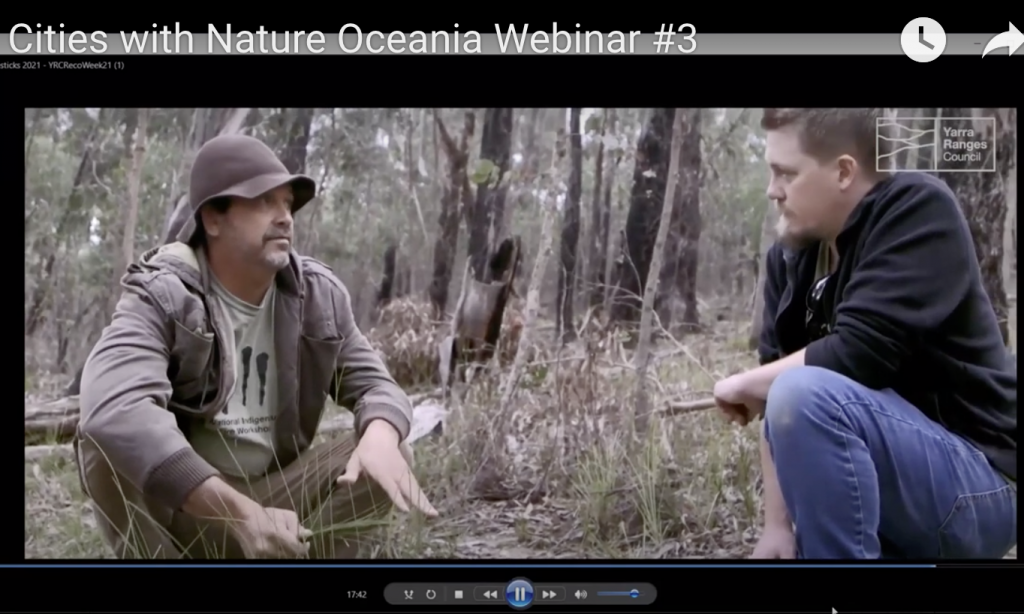
Announcing RegionsWithNature: a new platform that boosts nature action by regional governments

An exciting new initiative dedicated to regional governments and their nature work is being launched today at Daring Cities 2021, the global virtual forum for urban leaders taking on the climate emergency. RegionsWithNature will be a dynamic online space where regional governments and their partners can connect, demonstrate their commitment to biodiversity goals, and access resources to enhance their landscape and territorial actions for nature. RegionsWithNature is building on the success of CitiesWithNature – which has grown to 190 cities and 17 partner organisations since its launch in 2018 – and will follow a similar model.
This partnership initiative is being developed by founding partners ICLEI, Regions4, IUCN, the Group of Leading Subnational Governments toward Aichi Biodiversity Targets (GoLS) and others. Founding regional governments that have already thrown their weight behind RegionsWithNature include Yucatan State in Mexico, São Paulo State and Pernambuco State in Brazil, Goa State in India, the Comunidad de Madrid in Spain and the Western Cape Province in South Africa. RegionsWithNature is being championed by Governor Mauricio Vila Dosal from the State of Yucatan, who is also a Member of ICLEI’s Global Executive Committee where he leads the Biodiversity Portfolio.
Watch the announcement event on 8 October at 16:30 CEST – or the replay – by registering for free at https://daringcities.org/2021-registration . Hear from speakers from ICLEI, Regions4, Yucatan State, the Secretariat of the Convention on Biological Diversity and other leading organisations in this plenary session of the 2030 Visions Day of the Daring Cities forum.
Get a glimpse of what is to come by visiting the new website regionswithnature.org and follow @Regionswnature on Twitter to stay up to date about developments. If you would like to find out more about RegionsWithNature or are from a regional government or partner organisation who would like to join and help build RegionsWithNature, get in touch by emailing info@regionswithnature.org
The need for RegionsWithNature
Many of the actions that we need to take to tackle the climate and biodiversity crises are needed at the territorial and landscape scale. Regional governments such as provinces and states have different mandates from cities and have unique and vital contributions to make. Regional governments are best positioned to work at the larger scale of landscapes and to implement solutions that span from urban to rural areas. For example, to achieve resilient water catchments and sustainable food systems we must work at these scales. Regional governments also play an essential role in supporting and enabling the local governments within their jurisdictions. The IPBES Global Assessment Report on Biodiversity and Ecosystem Services emphasises that successful transformations towards sustainability, require governance approaches that are integrative, inclusive, informed and adaptive.
To support the nature ambitions of regional governments and to ensure that multi-level governance opportunities for action are maximised, regional governments require a dedicated space. RegionsWithNature is being developed at the request of regions to have a space to make their voices heard, to share their experiences, and to showcase their commitments towards achieving national and global biodiversity targets.
RegionsWithNature will serve regional governments from around the world, such as provinces, states, prefectures, and larger territories. The online platform will provide essential resources, tools and services and enable regions to mobilise political will and funding to achieve their ambitions for nature-positive development.
For media enquiries contact pieter.botha@iclei.org
The 2021 Learning Event #2
Biodiversity management
The event will provide an opportunity for municipal peer learning exchanges on biodiversity management for ecosystem restoration and discuss opportunities for funding and technical support. The theme of the event is ‘The Decade on Ecosystem Restoration’, in line with the global 10-year ecosystem restoration programme launched by the United Nations in 2021 with the aim of restoring ecosystems following the COVID-19 pandemic and supporting the implementation of the Sustainable Development Goals (SDGs). Municipalities play an integral role in the implementation of the SDGs, and should consequently be further empowered to restore and preserve ecosystems.
This event will be of particular interest to environmental practitioners in Metropolitan, District and Local municipalities; Department of Forestry, Fisheries and the Environment local government support personnel; District Development Hub personnel in District and Metropolitan municipalities; Spatial planning and land use management personnel in Metropolitan, District and Local municipalities; Provincial environmental affairs departments and their conservation agencies; National Government Departments and Non-governmental organisations working on biodiversity management and research.
RSVP by 20th September 2021 with Ms Khaya Gumede (kgumede@salga.org.za) to attend.
Objectives of the learning event:
- To engage with the community of practice of biodiversity professionals to enable them to share lessons about the implementation of biodiversity related projects.
- To capture implementation challenges and solutions, particularly with the intention of “Making the Case” for biodiversity funding models and allocations.
- To engage on strategies to enhance investment in ecological infrastructure and promote nature-based solutions in land use management practices.
- To foster relationships and partnerships between municipalities for ongoing exchanges and shared services.
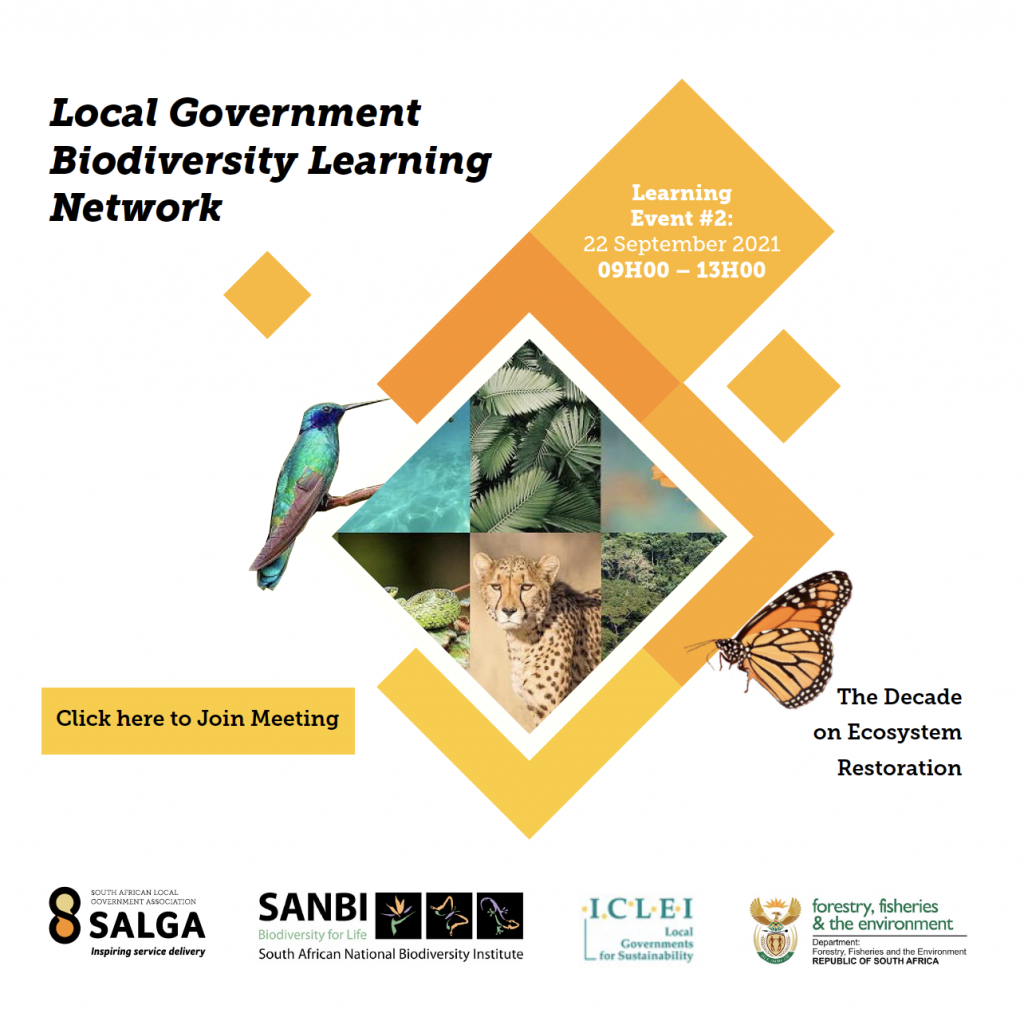

Stefania Romano, Global Coordinator for Recruitment and Advocacy at CitiesWithNature, writes from Marseille.
Thousands of people are connecting to Marseille in France this week to discuss how humanity shares the planet with our fellow living beings. The IUCN World Conservation Congress is gathering experts, governments and non-government voices from over 160 countries to make vital decisions about global conservation policy for the coming decade.
CitiesWithNature and a number of its partner organisations such as IUCN, ICLEI and WWF are leading the way on urban nature. ICLEI’s Cities Biodiversity Centre has been involved in the preparations of several events and webinars, collaborating with IUCN France, IUCN International, The Nature Conservancy, the French Biodiversity Agency, Chance Conseil and AFCCRE (French Association of the Council of European Municipalities and Regions), Durham University and Expertise France.
At the IUCN Local Action Summit on 3 September, Kobie Brand, ICLEI Deputy Secretary General, presented CitiesWithNature and the forthcoming RegionsWithNature at the session “Deploying Nature-based Solutions”. The speakers discussed how to take nature-based solutions to scale in cities and regions across the world. “Today the CitiesWithNature platform reaches 190 cities. We are proud to embrace large and small cities, all of them committed with their own pace, working together on mainstreaming nature and biodiversity,” said Brand.
On 4 September, Durham University and ICLEI’s Cities Biodiversity Centre (ICLEI CBC) co-hosted a session entitled: “Urban action towards a new deal for nature” where ICLEI CBC Director Ingrid Coetzee shared her insights.
Meanwhile at the European Pavillion, ICLEI’s European Secretariat has organised four events on nature-based solutions. One of these on 8 September revolves around CitiesWithNature and is entitled: “CitiesWithNature – Then, now and what next? Thinking Big”, in conversation with IUCN, The Nature Conservancy and OFB. This event will reflect on achievements and opportunities for CitiesWithNature.
At the Urban Pavillion in Marseille, WWF and ICLEI are hosting an event focused on cities’ ambitious actions for nature and ecosystem restoration on 7 September. Representatives of cities from France and elsewhere who are in Marseille are being invited to sign up to CitiesWithNature in person, while those attending virtually can do so at https://www.citieswithnature.org/. Cities are also being invited to sign the Edinburgh Declaration on the Post-2020 Global Biodiversity Framework.
On 8 September, AFCREE will lead a webinar, “Local and Regional authorities and their networks on the way to the COP 15”. Kobie Brand, ICLEI Deputy Secretary General, will be speaking about ICLEI’s role as focal point for local and regional authorities in the CBD negotiations. She will focus specifically on the main issues and expectations for local and regional authorities in the negotiations. At the end of the session the Marseille Declaration will be adopted, putting forward the position of local and regional authorities’ networks towards the international negotiations and COP15.
At another event on 8 September, ICLEI CBC Director Ingrid Coetzee will participate in a webinar organised by the Post-2020 Partnership which focuses on “The importance of whole of society mobilisation to ensure rigorous implementation of the Global Biodiversity Framework”.
A detailed programme of major urban nature events at the Congress is provided below.
IUCN Local Action Summit – 3 September
Showcasing the range of actions that can be taken by subnational governments and their partners to deliver conservation outcomes at scale; fostering partnerships between IUCN constituents and subnational governments and making the case for investing in nature-based solutions as part of a green recovery; and exacting commitments from subnational governments and their partners to help deliver the Nature 2030 IUCN Programme and, by extension, the post-2020 global biodiversity framework, Paris Agreement and Sustainable Development Goals.
At the session Deploying Nature-based Solutions, ICLEI Deputy Secretary General Kobie Brand presented CitiesWithNature and RegionsWithNature and how instrumental such initiatives are for taking Nature-based Solutions to scale. “Today we reached 190 cities in CitiesWithNature and we are proud that we embrace large and small cities, all of them committed with their own pace, working together on mainstreaming nature and biodiversity.
Through CitiesWithNature we serve our subnational governments, collectively, because collectively we are stronger.”
Chantal van Ham, Director for Europe at IUCN said, “Cities and regions are the place where change can happen and Nature-based Solutions are put into action”.
- Moderator: Chantal van Ham, Director for Europe, IUCN
- Scene-setter: Jean-Eric Paquet, Director-General, DG Research and Innovation, European Commission
- Panelists: Maud Lelièvre, President, IUCN French National Committee; Kobie Brand, Deputy Secretary General, ICLEI; Canddie Magdelenat, Sustainable Local Governments and Cities Expert, WWF, France.
WWF and ICLEI – Ambitious Actions for Nature and Restoring ecosystems – Urban Pavillion, 7 September, 15.00-16-00.
During this event WWF and ICLEI will showcase ambitious city actions undertaken for nature and restoring ecosystems.
- Introduction by WWF, Canddie Magdenalat
- Keynote speaker, Arnaud Gauffier, WWF Conservation Director
- Keynote speaker, Kobie Brand, ICLEI.
Local and Regional authorities and their networks on the way to the COP 15
8 September, 10.00-13.00. View it here: https://iucn2021.key4.live/
This event is organized by AFCCRE (French Association of the Council of European Municipalities and Regions). European and French high level and subnational officials and representatives from local, regional and international organizations will take part in the program. Kobie Brand, ICLEI Deputy Secretary General, will be speaking about ICLEI’s role as focal point for local and regional authorities in the CBD negotiations. She will focus specifically on the main issues and expectations for local and regional authorities in the negotiations. At the end of the session the Marseille Declaration will be adopted, putting forward the position of local and regional authorities’ networks towards the international negotiations and COP15.
Speakers:
- Màiri McALLAN MSP, Minister for Environment, Biodiversity and Land Reform, Scottish government
- Kobie BRAND, Deputy Secretary General of ICLEI
- Ivan DRAGANIC, Executive Director, Regions4
- Maud LELIEVRE, President of French IUCN Committee, General Delegate of Eco Mayors
- Russell GALT, Head of Urban Alliance, IUCN
CitiesWithNature – Then, now and what next? Thinking Big
8 September, 10.30 – 11.30, European Pavillion
The CitesWithNature movement – enhancing the value of nature one city at the time. In conversation with IUCN, The Nature Conservancy, OFB and ICLEI. Three years have passed since the CitiesWithNature platform and initiative has been launched. Now it is time to reflect on achievements to date and discuss opportunities and features that lie ahead. The founding partners of CitiesWithNature together with OFB will discuss and carve out a solid pathway for the future of the initiative together with the audience’s ideas and support.
Speakers:
- Voice of IUCN for CitiesWithNature – Susanna Gionfra
- Voice of TNC for CitiesWithNature – Robert McDonald
- Presentation by OFB/ARB on their work around urban nature and how it links to CitiesWithNature
- The Edinburgh Declaration and CitiesWithNature – Julie Delcroix from the European Commission.
Vertical gardens of the Provenza Arriba residential apartment block in Medellin, designed by ALH Taller.
Happy children, ecomimicry, Medellin, wetlands and the 2030 biodiversity goals. What do all these things have in common? They feature in the latest edition of the CitiesWithNature Buzz, of course! Don’t miss the latest roundup of urban nature news, opportunities and events from around the world in the September edition.
Also read about Freetown’s innovative tree planting, Barcelona’s toolkit for urban green justice, a new online learning platform for African cities, Melbourne’s resilience strategy, the Cities4Forests call to action and more.
Have you already joined CitiesWithNature as a city or partner organisation? Feature your urban nature news in the Buzz by submitting a short piece and a link via this Google Form.
You can also delve into past issues of the BUZZ where you will find various valuable reports and resources on Nature-based Solutions, urban biodiversity and more. See the past issues here.
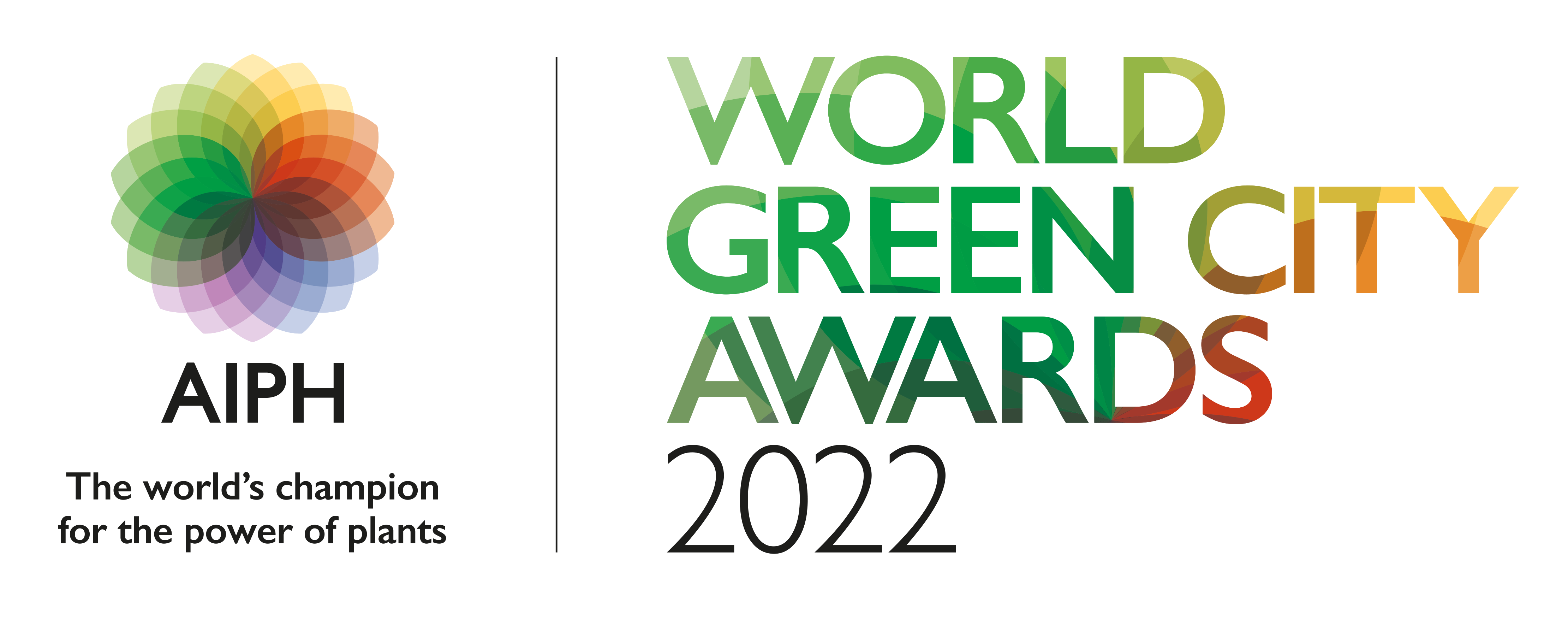
AIPH, the International Association of Horticultural Producers and the world’s champion for the power of plants proudly presents the AIPH World Green City Awards, which recently opened for entries for the 2022 inaugural edition.
AIPH invites all cities, large and small, to showcase their ambitious actions by entering the 2022 edition of the AIPH World Green City Awards.
The leading role of city authorities is recognised for promoting and supporting greater inclusion of nature and plants in urban environments. The AIPH World Green City Awards 2022 are designed to champion ambitious nature-orientated approaches to city design and operation. Specifically, they seek to recognise public initiatives relying on a greater use of plants and nature to create better city environments – helping to fulfil local aspirations for improved economic, social and environmental resilience.
The awards celebrate innovation, achievement, and commitment to the globally recognised imperative to embrace a nature-orientated solutions that harvest the power of plants and associated ecosystem services to help address the major challenges facing cities today – or tomorrow. AIPH initiated these awards to bring wide recognition to the value of plants in providing solutions for common city problems and to create an enabling environment to shape and nurture a strategic shift in city governance and planning.

UrbanByNature webinar series explores Nature-based Solutions in China
On 18 August, UrbanByNature China will host a webinar exploring the enabling conditions and barriers to implementing nature-based solutions, featuring experts from China and the Connecting Nature and CLEVER Cities initiatives.
Speakers will include:
- Stuart Connop, Senior Research Fellow, Sustainability Research Institute, University of East London, UK
- Nian She, Tsinghua University Innovation Center in Zhuhai, China
- Carolina García Madruga, Senior Researcher in Sustainability and Urban Regeneration, Tecnalia, Spain
- Sean Bradley, CLEVER Cities Programme Manager, Groundwork London, UK
- Taoran Guo, Forest City Studio, Shanghai, China
The webinar will be moderated by Chuntao Yang, Program Officer at ICLEI East Asia Secretariat Beijing Office and simultaneous translation (English and Chinese) will be provided.
Tune in on Wednesday 18 August, 9:00 CEST/ 15:00 BJT/CST
You can attend this exciting webinar by registering here.
Find out more about the webinar series here.
What is UrbanByNature?
UrbanByNature is an expertise-sharing and capacity-building programme to empower local governments all around the world to harness the boundless potential of nature for sustainable urban development.
Fuelled by science-supported implementation of nature-based solutions, UrbanByNature offers support to cities as they embark on the journey to becoming CitiesWithNature. The programme aims to bring together established and aspiring urban nature pioneers from local governments, civil society and businesses to co-create a nature-based, sustainable and resilient urban future.
UrbanByNature is hosted by the CitiesWithNature platform and has successfully been launched in Brazil, South Korea and the Caucasus as part of the Horizon 2020 project Connecting Nature.
Learn more about the UrbanByNature Programme here.
We are happy to share that 8 80 Cities is now collaborating with CitiesWithNature to make cities around the world greener, healthier and happier places for young and old. CitiesWithNature is a unique initiative that recognizes and enhances the value of nature in and around cities across the world. It provides a shared platform for cities and their partners to engage and connect, working with a shared commitment towards a more sustainable urban world. 8 80 Cities is joining other leading partners of the CitiesWithNature initiative such as WWF, UNEP, IUCN, Cities4Forests and World Urban Parks.
On the CitiesWithNature platform, cities can embark on a journey to reconnect their communities to nature. Cities can showcase their nature projects on their city profiles, access over 200 cutting-edge tools and resources from partners on the Tools and Resources Hub, use the robust framework of the Nature Pathway to mainstream nature in their cities, connect with partner organizations, and more. Joining CitiesWithNature is free. Representatives from city governments can do so on the website or by writing to info@citieswithnature.org. Not part of a local or subnational government? You can still access various benefits on the website and subscribe for free to the CitiesWithNature Buzz, a monthly round-up of urban nature news and events from around the world.
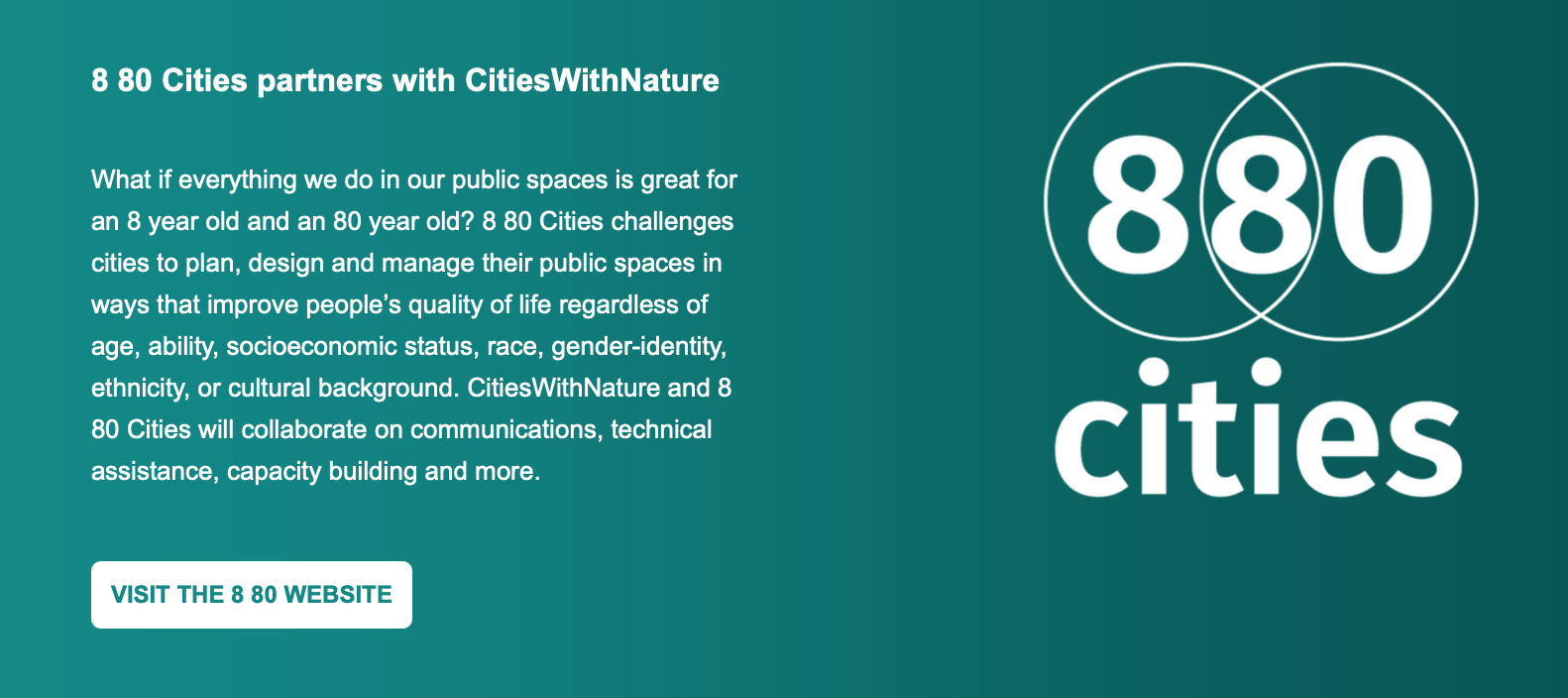
CitiesWithNature is in the spotlight in Australia, where ICLEI Oceania kicked off its new CitiesWithNature webinar series on 14 July with a session targeted at Elected Members of city councils. It aimed to raise councillors’ awareness of the importance of embedding Nature and Biodiversity in all city plans to boost the health and liveability of their communities.
Image: Creek Heroes, City of Onkaparinga
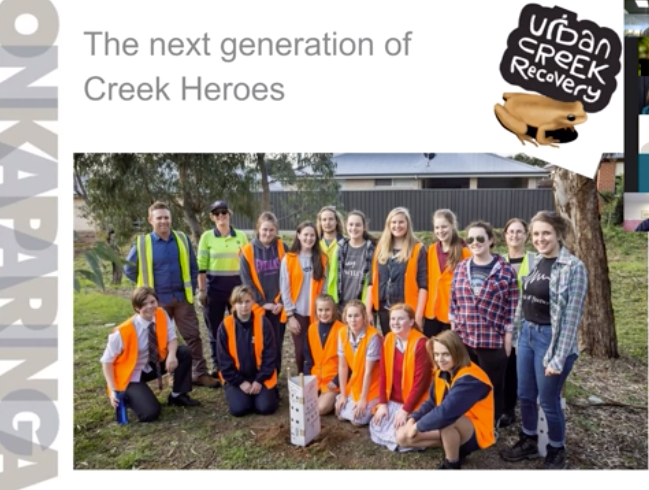
The webinar heard from Prof Niki Frantzeskaki of Swinburne University about the many dimensions of nature-based solutions and how they interface with climate, socio-economic and socio-cultural systems. This was followed by three stories from Australian cities:
- Biolink and Woody Meadow projects in Port Phillip
- Creek Recovery Campaign and Creek Heroes in Onkaparinga
- Living With the Bush and Keep Cats Safe At Home initiatives in the Blue Mountains.
And finally they learnt about the Living Melbourne initiative which is delivering an integrated Urban Forest Strategy across the 32 municipalities of Greater Melbourne.
“Local Government is where great work is being done to re-introduce Nature to our cities” said ICLEI Chair and webinar moderator Cr Amanda Stone. “It was inspiring to hear directly from councillors about innovative projects in their cities.”
This was just the first of a series of webinars on CitiesWithNature to be held by ICLEI Oceania this year. In August there will be a focus group webinar for cities which have participated in the ICLEI-Swinburne needs-assessment research interviews (participants only), and in September there will be a special webinar dedicated to Indigenous Land Management and how this can be applied in urban areas (open to all)
Keep an eye on the CWN Oceania website here for updates.
